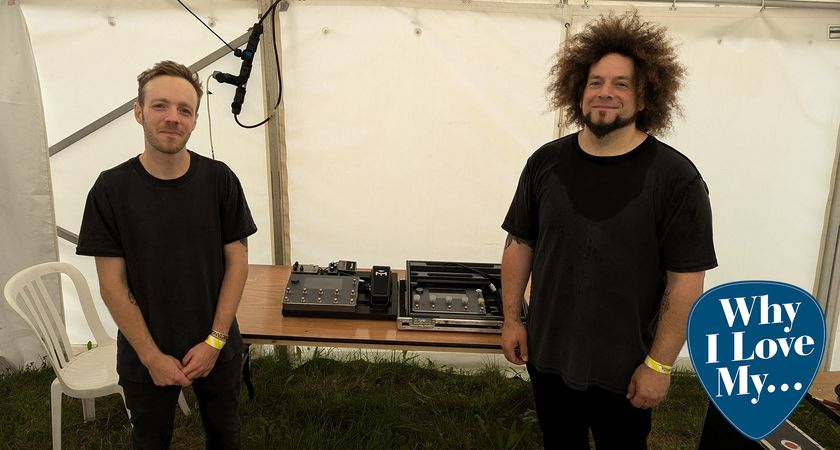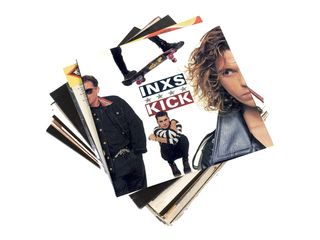
Andrew Farriss talks INXS' Kick album track-by-track
Although he can chuckle philosophically about it now, INXS' Andrew Farriss remembers the time when the band turned in their sixth studio album, Kick, to their record label. The reaction, he admits, was less than enthusiastic. "They thought we were from Mars," he says. "‘What are you doing?’ they said. ‘We can’t get this on the radio. You have to be like what’s happening now.’ And we were like, ‘Well, we think this is what’s happening now.’"
The six-piece Australian band (which then featured the original lineup of Farriss and his brothers Jon and Tim, along with the late Michael Hutchence, as well as Kirk Pengilly and Garry Gary Beers) had just come off a sizable hit with 1985's Listen Like Thieves, and the label wanted to take no chances at building on its success, even offering the group $1 million to go back to the drawing board to record another album.
“Ironically, I think they were trying to help us," Farriss says. "I don’t blame them – we’ve never been an easy band to figure out. I think the passage of time has really proved that Michael and I as songwriters did what we needed to do."
After a nearly 10-year slow-but-steady climb, INXS had finally scored a breakout hit with the rock-funk track What You Need (from Listen Like Thieves). "It had this this balls-to-the-wall chorus and a funk-rock beat that worked so well together," Farriss says. "When it got on the charts, Michael and I looked at each other and said, ‘OK, we might be on to something.’"
With the rest of the band's blessings, Farriss and Hutchence holed up to write the album that would become Kick. They used What You Need as their template. "The melding of funk and rock was always in our heads," says Farriss. "We were very excited about the idea of overlaying two types of songs and genres together. There’d been disco in the ‘70s, and people had flirted with certain combinations, but it was always tentative. We decided to not be nervous about veering from straight eights."
As they had done on Listen Like Thieves, the group recorded with famed producer Chris Thomas (Sex Pistols, the Pretenders). Farriss raves about Thomas' approach in the studio. "What Chris brought to us was sort of an extension of what we were already feeling," he says. "His attitude was very daring and free. He trusted our vision, and I have to say that his belief in our confidence was so important.”
Despite the label's initial objections, INXS prevailed and released Kick as originally intended, and the result was a worldwide smash, with the songs Devil Inside, New Sensation and Never Tear Us Apart reaching the Top 10. The album's lead-off single, Need You Tonight, went all the way to No. 1. All told, Kick has sold a staggering 10 million copies.
“I think what makes the Kick album so dynamic is that we weren’t so much interested in what everybody else was doing as we on what we wanted to do," says Farriss. "It’s really that simple. Michael and I were extremely focused as songwriters, and the band was very intent on making a series of recordings that we could be passionate about."
To commemorate Kick's 25th anniversary, the album has been rereleased in three newly remastered editions, including a super deluxe 3CD/DVD/80-page hardcover book edition. Reflecting on the record's place in history, Farriss strikes a personal note: “It’s a very special record in so many ways," he says. "More than anything, I feel very fortunate to have worked with Michael, my brothers and the other guys in INXS on Kick. It was really an incredible experience.”
On the following pages, Andrew Farriss discusses the writing and recording of Kick track-by-track.

Guns In The Sky
“Michael wrote this one. It started off as a demo that we cut in Hong Kong. I helped him program the drum parts on a Roland 707 that I had. He had a very clear idea of how he wanted the song to go, which I totally respected.
“We brought the demo back to Sydney, played it for the other guys, and they all loved it. Tim does an amazing guitar solo – it’s so harsh and biting. Everybody else really dug in and made the tune rock pretty hard. It’s like hip-hop and heavy metal in spots.
“Michael’s vocal is so important to how the song works. There isn’t a trace of irony or glibness to what he’s saying. It’s no bullshit.”
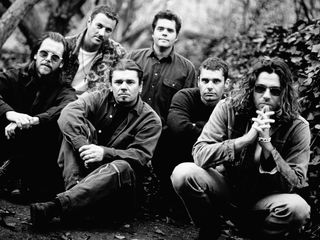
New Sensation
“This is part of the first batch of songs that Michael and I wrote for Kick. It started out with a blues feel, and the demo had a funky drum box pattern. Even now, the verse moves along in a typical blues pattern, but when it gets to the chorus it gets kind of strange.
“The notes, the whole feel, it’s definitely weird and quirky. I love Kirk’s sax playing, Jon’s drumming is amazing, and Garry’s doing incredible things on the bass – the whole band is so solid. They really took hold of a song that doesn’t make any sense at all.
“It still amazes me to see audiences going crazy to it. Really, I think New Sensation is such a odd song to have been a hit. We definitely did something right with it.”
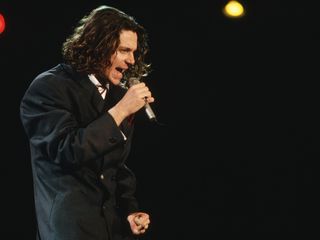
Devil Inside
“It’s a pretty strong riff. We were on tour, and the band was staying at a hotel in Edgewater Road in London. That's where I wrote the riff – I put it on a demo in my room. I worked out the chords, played everything for Michael, and he said, ‘That’s really good. Let’s run with it.’
“The band did a phenomenal job on it. It’s still a cracker of a song to play live, because what you hear on the record is just that – the group is performing together in the studio. There’s some overdubs, but not as many as you might think.
“I give a lot of credit to Chris Thomas for preserving that live feel. It’s a funny thing. If you know the right parts, you can pretty much play this song, and the whole of the Kick album, as a bar band. You don’t need an orchestra, you don’t need 24 tracks of backing tapes – if you know the song, you can do it.”
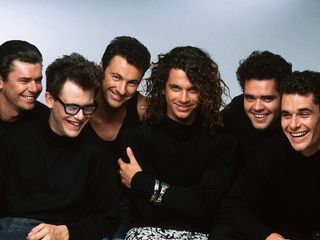
Need You Tonight
“Another weird, quirky song. I demoed it at home in Sydney while a cab waited outside to take me to the airport. Why I thought it was so important, I couldn’t tell you. It was this little thing that I worked on with my eight-track, and I bounced it down to a cassette recording.
“I made the plane with just minutes to spare and flew to Hong Kong, where Michael and I were working on some ideas. He loved what I played him and said, ‘Give me a pad and a pen.’ He sat down and wrote the lyrics in something like an hour. The engineer put a mic up, and while Michael sang right there, I replayed the parts, with the drum machine, onto a 24-track, two-inch analog tape. That’s pretty much what you’re hearing.”
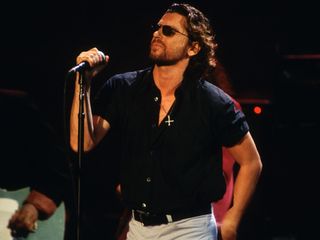
Mediate
“It has the same Roland 707 drum machine that I used to program the part for Need You Tonight. I hadn’t touched the beats per minute knob at all. And when I say ‘knob,’ that shows you how old school it was. It was way before the heavily quantized, locked-in and gridded beats per minute thing; everything had a variable air about it. It wasn’t synced perfectly. There was a drifting quality to it.
“It never occurred to me that the two songs, Need You Tonight and Mediate, could share the same beats – that was Chris Thomas’ idea.
“Michael and I wrote everything together but two songs: he wrote Guns In The Sky on his own, and I did Mediate by myself. What I wanted to create was a Brian Eno-type landscape with keyboards, one which was very emotive and gentle, against a hard funk beat.
“Michael’s vocal is like some sort of New Age rapping. It’s surreal. At the time, it must have turned people’s heads. I remember hearing it in a club in Houston, and I have to say, I thought to myself, Wow… this is pretty interesting. I didn’t have anything to compare it to.”
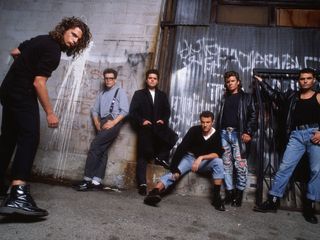
The Loved One
“It was written by some of the guys in an Australian blues band from the 1960s called The Loved Ones. We always loved it. It was my brother Tim’s idea to record our own version of it, just a balls-to-the-wall blues-rock track, and not be forgiving about it.
“It has a very important place on Kick in that it balances out the experimentation, us messing around with technology and trying to forge our way into the future. At the same time, it’s our tip of the hat to our rock and blues influences. I’ve got Tim to thank for that.”
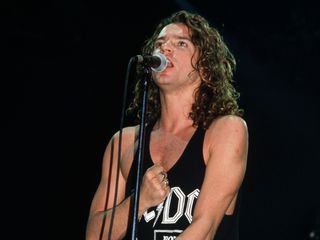
Wild Life
“I don’t exactly know why we wound up zeroing in on this one. There were other songs that didn’t make the Kick album that might have been equally as good – it’s hard to say. What I do like about it are Michael’s vocals and the groove – it swings along in its own way and does things that typical pop songs don’t.
“It’s another good example of what we were trying to do overall as a band, which was to blend funk and rock. You’ve got a lot of small sounds married to heavy guitars through Marshall amps. It’s a great combination. Your ears are constantly being challenged and pulled different ways. The drums, too – there’s big, fat, ambient drums that exist in the same sonic space as these tiny little drum boxes.”
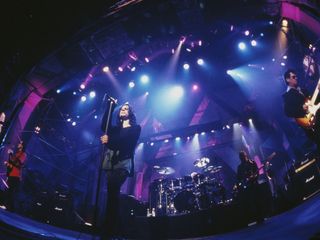
Never Tear Us Apart
“In preparing the 25 Anniversary rerelease of Kick, I went back into the tape box and listened very carefully to the master recordings and some of the other studio reels, and I was amazed at the version of Never Tear Us Apart. It’s us playing live with no overdubs. The drum take is the same as what’s on the album, but there’s a different arrangement, different vocal, sax part, and there’s no strings.
“On the record, I played the string parts on a keyboard, but originally I did it on guitar. When I heard the tape again, I thought, Wow, this is pretty cool. It shows people exactly what we were thinking when we did the demo. Chris Thomas said to us, ‘This is a great song, but I don’t know about the instrumentation. I think it needs a more formal sound.’ He suggested the strings, which worked beautifully. They have the right kind of empathy for the vocal.
“Thinking about Never Tear Us Apart, I just have to say how much respect I have for Michael as a songwriter, a singer and, in particular, as a lyricist. He didn’t play an instrument, but his voice and his words were his instruments. He was phenomenal.”
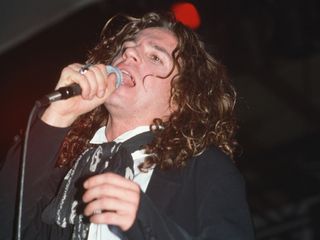
Mystify
“Jon Farriss and I were talking about the song the other day. It has a groove that’s almost like blues, but it more goes into the zone of Swing. It was a funny track for us to be doing in that era. The whole music scene had moved away from your basic bar-band blues scene, which is what our background was, playing pubs and all.
“Going into the Kick album, Michael and I were in Chicago, working on a few more demos. It was a 16-track studio with a piano. We wrote Mystify there, made a demo of it and a couple of others – there was a song called Move On that didn’t make the record. The band loved Mystify, and they really did a great take of it. Tim and Kirk’s guitar playing is fantastic. The drums are just massive. The whole thing turned out cool.”
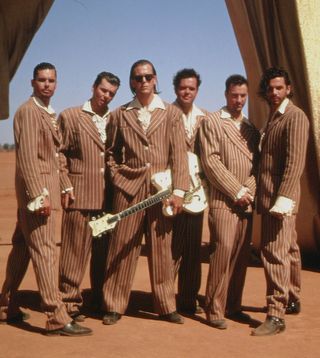
Kick
“When I made a demo of the song, it had a lot of acoustic guitar and was quite different from the album version. Michael really liked it, but he wanted to toughen it up. He thought we should get rid of the acoustics and play it as a straight-out rock song with the brass and everything. I think that was the right call.
“The band did a knockout job, but Michael really took ownership of the song. If you listen to the vocal, he’s unbelievable – such cool confidence. Great sax by Kirk, as always.”

Calling All Nations
“We’ve been playing it live again recently and having some fun with it. It fits in with the whole funk-rock genre of what we were trying to stay the course with. I think the song ties everything together with its big, thumping groove.
“We had toured a lot and had been around the world, so we wanted something that reflected what we were feeling. When you travel internationally as much as we had, and you’re under so much pressure, you do think to yourself sometimes, Well, what are we doing?... We weren’t just in one country with one mindset of people. We were talking to everybody. So to have a song titled Calling All Nations made a lot of sense.
“I love the musicianship on the track. Everybody contributed really interesting and effective parts. The song felt right. In fact, we even called one section of our tour for the album the Calling All Nations tour.”
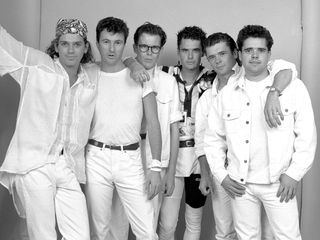
Tiny Daggers
“To me, it sounds almost like Springsteen, but that’s not what Michael and I were thinking of as writers. When we put the demo together, believe it or not, we were more thinking, What would Elvis do?
“It changed a bit when we got around to recording it. The rhythm track is particularly cool – great work by Jon and Garry there. I actually wound up playing a pretty big guitar solo on the song, which is a first for me. Usually Tim or Kirk handle the solos, so I’m kind of proud of my bit on the guitar. And it ends the record well, so there you have it.”

Joe is a freelance journalist who has, over the past few decades, interviewed hundreds of guitarists for Guitar World, Guitar Player, MusicRadar and Classic Rock. He is also a former editor of Guitar World, contributing writer for Guitar Aficionado and VP of A&R for Island Records. He’s an enthusiastic guitarist, but he’s nowhere near the likes of the people he interviews. Surprisingly, his skills are more suited to the drums. If you need a drummer for your Beatles tribute band, look him up.

"Reggae is more freeform than the blues. But more important, reggae is for everyone": Bob Marley and the Wailers' Catch a Fire, track-by-track

“Part of a beautiful American tradition”: A music theory expert explains the country roots of Beyoncé’s Texas Hold ‘Em, and why it also owes a debt to the blues

"Reggae is more freeform than the blues. But more important, reggae is for everyone": Bob Marley and the Wailers' Catch a Fire, track-by-track

“Part of a beautiful American tradition”: A music theory expert explains the country roots of Beyoncé’s Texas Hold ‘Em, and why it also owes a debt to the blues
Most Popular







